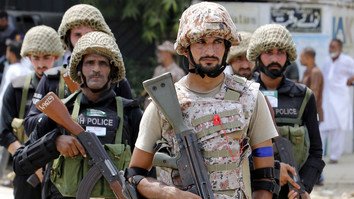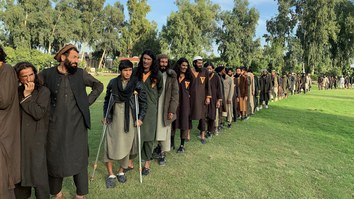KARACHI -- Pakistan has seen a drop in terror incidents and related deaths over the year, according to the 2019 Global Terrorism Index published by the Sydney-based Institute for Economics & Peace (IEP).
In 2018, the number of terror-related deaths fell 37% to 537, and the number of incidents declined 36% to 366, according to the report released November 20.
The numbers of deaths and incidents are 81% and 77% lower, respectively, than their peaks in 2013, the report said.
However, Pakistan remains one of the five deadliest countries in the world for violence by proscribed militant groups.
![Karachi peace activists in December 2017 protest atrocities by Taliban militants. [Zia Ur Rehman]](/cnmi_pf/images/2019/12/06/21213-pf_photo_02-585_329.jpg)
Karachi peace activists in December 2017 protest atrocities by Taliban militants. [Zia Ur Rehman]
Pakistan from 2016-2018 continued to rank fifth among the countries most impacted by terrorism. It ranked second in 2012, third in 2013 and fourth in 2014-2015.
"Despite this year's relative improvement, terrorism remains a major threat in Pakistan," the report said.
ISIS-K
"Islamic State of Iraq and Syria"'s Khorasan branch (ISIS-K), Tehreek-e-Taliban Pakistan (TTP) and Lashkar-e-Jhangvi (LeJ) were mainly responsible for terrorist-inflicted deaths in Pakistan in 2018, according to the report.
ISIS-K was the deadliest of the three in 2018, being responsible for 251 deaths -- or 36% of such fatalities in the country -- most of which occurred in Balochistan.
The deadliest terrorist act that year took place in July 2018 at an election rally for a candidate of the Balochistan Awami Party in Mastung District, Balochistan, killing at least 150 people and making it the third most lethal terror attack globally for that year.
In Pakistan, dating back to 1970, that suicide bombing's death toll was second only to that of a Taliban attack on the Army Public School (APS) in Peshawar in December 2014. That massacre left more than 150 children and teachers dead.
Since the Mastung bombing, Pakistani law enforcement agencies have launched extensive counter-terrorism operations in the province against ISIS-K and have killed a number of its leaders. Hidayat Ullah, the Mastung attack's mastermind, was among those killed.
Authorities have made efforts to counter the influence of the group, paying special attention to potential recruiters in academic institutions.
ISIS-K has become deadlier in Afghanistan and Pakistan, with a sharp increase from 6.3 deaths per attack in 2017 to 12.1 in 2018.
"This is in line with the ISIS's growing presence in South Asia, following military defeats in Iraq and Syria," the report said.
ISIS leader Abu Bakr al-Baghdadi was killed along with a large number of other militants in a nighttime raid on October 26 by US special forces in northwest Syria, a development not included in the report because it occurred in 2019.
In May, ISIS announced it had established a "Hind Province" in Pakistan. The announcement came after ISIS claimed an attack in Indian-administered Kashmir.
Since then, ISIS has falsely claimed responsibility for a number of terrorist attacks and other criminal activities in the past few months in Pakistan in an attempt to raise the group's profile in the face of dwindling fortunes.
The report also observed that the trend of reduced terrorism reflects the continued decline in terror activity of the TTP, Pakistan's deadliest terrorist group over the past decade. The TTP has been responsible for at least 4,800 deaths since 2007, killing more than 740 people in 2010 alone.
In 2018, deaths attributed to the TTP dropped by 56% to 151, according to the report.
The report noted that 2018 saw a historically low level of activity from LeJ, a proscribed outfit that is allied with ISIS-K, with the third major terrorist group committing only two attacks, which took six lives.
Improvement in security
Government efforts, including military operations, led to the decline in terrorism, according to security analysts and law enforcement officials.
Starting from 2009, the Pakistan army launched a series of military operations to dismantle the networks of the militant outfits, including the TTP and ISIS-K, and killed or captured many of their leaders.
"In fact, the TTP attack on [APS] in Peshawar that killed at least 151 people, mostly schoolchildren, alarmed the Pakistani political and military elite and generated a strong resolve to confront the terror outfits' threat seriously," said a security official in Quetta.
"After the arrival of the ISIS in the region and the formation of its Khorasan chapter, Pakistan law enforcement agencies have intensified their intelligence-based operations across the country, particularly Balochistan Province," said the official, who requested anonymity because he is not authorised to speak to the media.

![Paramilitary Rangers November 20 perform their duties in Karachi. [Zia Ur Rehman]](/cnmi_pf/images/2019/12/06/21212-photo_1-585_329.jpg)







Indeed, an informative article.
Reply1 Comment(s)